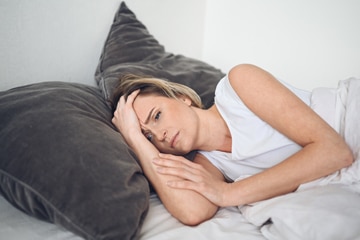
Sleep is essential for maintaining optimal health and well-being at all stages of life. Getting a good night’s sleep is just as important as regular exercise and a healthy diet. Studies have found that poor sleep has immediate negative effects on the hormones, exercise performance, and brain function. Not getting proper sleep can also cause weight gain and increase the risks of chronic diseases, ranging from heart disease and stroke to obesity and dementia. Here are 8 strategies to enhance sleep quality during the night –
- Stick to a sleep schedule – Generally, the recommended amount of sleep for a healthy adult is eight hours. Set aside no more than eight hours for sleep. Go to bed and get up at the same time every day, including weekends. Maintaining a consistent sleep schedule helps reinforce the body’s sleep-wake cycle.
- Create a restful environment – Always keep the room cool, dark and quiet. Exposure to light in the evenings may make it more challenging to fall asleep. Avoid prolonged use of light-emitting screens just before bedtime. Using room-darkening shades, earplugs, a fan or other devices can help create an environment conducive to sleep. Taking a bath or using relaxation techniques may also promote better sleep.
- Limit daytime naps – Long naps in the daytime can interfere with night-time sleep. Try to limit naps to no more than one hour and avoid napping late in the day. However, people working at nights can take a nap late in the day before work.
- Use quality bedding – Bedsheets and blankets used play a major role in enhancing sleep. Use bedding that is comfortable to the touch and will maintain a comfortable temperature at night.
- Find an agreeable temperature – Never make bedroom temperature to be a distraction by feeling too hot or too cold. The ideal temperature can vary based on the individual. But, most research supports sleeping in a cooler room that is around 65 degrees.
- Limit intake of alcohol and caffeine: Avoid beverages close to bedtime. As wine, chocolate, or any other caffeinated food or beverages act as stimulants, avoid them. While alcohol may initially make you feel drowsy, it can disrupt sleep later in the night. Avoid acidic or spicy foods, like citrus fruits, juices, and spicy meals, which can cause heartburn and disturb sleep.
- Exercise – Incorporating a brisk daily walk into your routine not only aids in weight management, but also promotes better sleep. However, being active too close to bedtime can have a stimulating effect. Instead, opt for morning workouts that expose you to bright daylight.
- Manage stress – Stress can disrupt sleep. Try to resolve or eliminate your worries, stress or concerns before bedtime. It’s important to create a bedtime routine that allows you to wind down and relax before sleep. Practicing relaxation techniques, such as the relaxation response, can promote better sleep and reduce daytime anxiety. Do deep breathing exercises to induce relaxation – try inhaling slowly and deeply, and then exhaling. Other strategies to relax include listening to soft music, reading a book, and taking a hot bath.
Sleep plays a vital role in overall health. Insufficient sleep to an increased risk of many diseases and affect mental wellbeing. Following the above-mentioned tips can help you get a good night’s sleep.